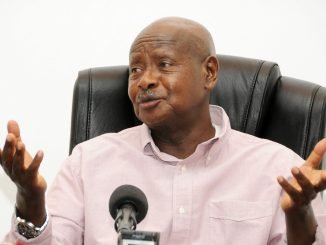
Kumi, Uganda | URN | Maj. Kanuti Akorimo, the man who hoisted Uganda’s National Flag on October 9, 1962, died a quiet and frustrated. Maj. Akorimo, died at Atutur Hospital in Kumi District on Wednesday 22, April 2020 morning.
Born in Omatenga village in Kumi district on January 6, 1931, Akorimo rose to fame after undergoing education and training by the British, a few years before Uganda attained her independence and the events of Uganda’s independence where he is mostly remembered for lowering the union jack and raising the Uganda flag on October 9, 1962.
His widow, Florence Agwang told our reporter that despite the fame and status that he had back in the day, the old man’s life has been characterized by poverty, suffering and regret.
She explains that says that from the time of his retirement, Akorimo tried to concentrate on his family. However, in his life journey, he lost two of his three wives and seven of his 20 children leaving him more disheartened.
“We have been surviving on handouts and hard labour. I resorted to charcoal burning but when Mzee’s health degenerated, I couldn’t handle. Currently, we don’t even have enough food for the family because most of the time, I have been with Mzee to the hospital,” Agwang said.

Agwang says that only three of Akorimo’s children have studied beyond Ordinary Level (S.4) and a majority have not sat Primary Leaving Examination- PLE. She notes that the flag hoister was financially constrained and psychologically tortured after failing to access his retirement benefits.
According to Agwang, Akorimo would, on several occasions, lock himself inside the house and cry as life became tough. She points out Uganda’s independence day as one of those that evoked sad memories for him.
Joyce Asekenye, the Chairperson of Iteso Cultural Union in Kumi District says Akorimo was abandoned by the government and fellow leaders in Teso, adding that there has been a big gap between the government the family and the local leaders in Teso on the matters of his plight.
But Helen Christine Amongin Aporu, the former Kumi Woman MP and State Minister for Teso Affairs says that President Yoweri Museveni had taken note of Akorimo’s issues and had directed Kumi District Health Officer, Opolot (now retired) to take charge of Akorimo’s health.
Amongin explains that by the time the President asked the army to construct a house for Akorimo, many other considerations for his welfare had been planned but not much was realized. When asked why the government didn’t consider paying Akorimo’s package, Amongin said she had no answer.
Albert Odeke, a resident of Atutur in Kumi says it’s regrettable for a person like Akorimo, whose effort has seen Uganda grow, die in tears of frustration and regrets. He wants the government to consider Akorimo’s family and build for him a monument.
Who is Maj. Akorimo Kanuti?
Akorimo started his career as a Clerical Officer at British American Tobacco-BAT Jinja at the age of 21, just a year after training in Kisumu Commercial School, Kenya and wedding his first wife, Gabudesia Arionget in 1952
In 1953, he was employed in the East African Army Service Corps and later joined the army to fight the MAU- MAU rebellion. While in the army, he attended a number of courses including infantry, military education, clerical and Officer Cadet Course in Nakuru. He also attended Officer Cadet Selection Board and passed.
Early in 1961, Akorimo flew to Britain to attend an Officer Cadet Course at MONS, and upon returning to Uganda was posted to the 1st Battalion in Jinja and given the responsibility of internal security for the whole country to maintain peace and stability.
At the time of Uganda’s independence in October 1962, Akorimo was given the responsibility of lowering the Union Jack and raising the Uganda Flag, a task he is mostly remembered for. But he continued to carry on some other responsibilities in Uganda and in the East African Community.
Read Also: Former Presidential candidate Maj Gen Benon Biraaro is dead
In 1963, he was posted to the School of East Africa in Nakuru Lanet where he served as an Administrator and promoted to the rank of Captain. In July 1964, he was recalled by the government of Uganda to take charge of the Military Headquarters at Entebbe as Commandant and promoted to Major.
Akorimo worked as a Commanding Officer in Mbarara in 1965 and later posted to Moroto where he opted to retire in August 1968 at the age of 37. His retirement was informed by what he described as unbearable country leadership which had tribal and religious tendencies in the army
Maj. Akorimo was laid to rest on Friday at his home in Omatenga where thousands of people braved through the COVID-19 strict guidelines to pay respect to the departed statesman. Akorimo succumbed to aspiration pneumonia caused by stroke. He was 89 years.



